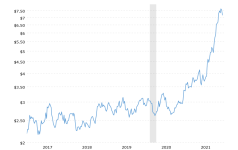Join the Hide community
Get access to live stream, lessons, the post exchange, and chat with other snipers.
Register
Download Gravity Ballistics
Get help to accurately calculate and scope your sniper rifle using real shooting data.

Install the app
How to install the app on iOS
Follow along with the video below to see how to install our site as a web app on your home screen.
Note: This feature may not be available in some browsers.
You are using an out of date browser. It may not display this or other websites correctly.
You should upgrade or use an alternative browser.
You should upgrade or use an alternative browser.
Inflation.......... ?
- Thread starter Hobo Hilton
- Start date
Americans will pay more to heat their homes this winter because fuel prices are soaring amid a supply imbalance, Energy Secretary Jennifer Granholm said Sunday.
“It will be more expensive this year than last year,” Granholm said during an appearance on CNN’s State of the Union. “Oil-and-gas companies aren’t flipping the switch as quickly as the demand requires.”
Sounds like Granholm is placing blame on the oil companies rather than this administration.... Maybe it's my imagination.

 www.barrons.com
www.barrons.com
“It will be more expensive this year than last year,” Granholm said during an appearance on CNN’s State of the Union. “Oil-and-gas companies aren’t flipping the switch as quickly as the demand requires.”
Sounds like Granholm is placing blame on the oil companies rather than this administration.... Maybe it's my imagination.

Expect More Expensive Heating Bills This Winter, Energy Secretary Says
The Energy Information Administration has forecast a jump in the price of natural gas and oil to heat homes this winter. Its latest forecast is due out this week.
Does this mean gold and silver are good places to be? They too are Fiat in some ways, except for the demand for them in electronics production.Put this tweet on your refrigerator door and keep it there for a long time. Michael Saylor is CEO of Microstrategy.
View attachment 7731448
I'm watching a small organic farm, across the road from me. They are perfecting growing veggies during the winter in Montana using caterpillar tunnels. Something they learned from those with green houses in Alaska and the UK.Wise words. A little late in the year to be growing now though!
My cart is always different as I buy what’s on sale, and or what I have coupons for.
Just one of many articles:

What To Grow In A Greenhouse In Winter | Garden Products
There are plenty of plants you can grow in a greenhouse in winter - read our complete guide on what's best to grow and how to care for them!
 www.garden-products.co.uk
www.garden-products.co.uk
It’s also a good time to prep soil, grow nitrogen trapping plants for green manure, etc. definitely not a time to sit on your ass. Everything that happens to you today is a result of what you did and decided 365 days ago.I'm watching a small organic farm, across the road from me. They are perfecting growing veggies during the winter in Montana using caterpillar tunnels. Something they learned from those with green houses in Alaska and the UK.
Just one of many articles:

What To Grow In A Greenhouse In Winter | Garden Products
There are plenty of plants you can grow in a greenhouse in winter - read our complete guide on what's best to grow and how to care for them!www.garden-products.co.uk
Yes, as a possible hedge against inflation. But having gold and silver returns no dividends, no interest. I'd rather invest in the fortune 500 and expect the business returns to rise enough to offset inflation.Does this mean gold and silver are good places to be? They too are Fiat in some ways, except for the demand for them in electronics production.
Sensible stuff in a avalanche of bullshit.Yes, as a possible hedge against inflation. But having gold and silver returns no dividends, no interest. I'd rather invest in the fortune 500 and expect the business returns to rise enough to offset inflation.
More  world.
world.

 www.yahoo.com
www.yahoo.com

Democrats Call On Biden To Ban Oil Exports
A group of Democratic Senators has called on President Joe Biden to reimpose a ban on crude oil exports as the administration struggles to contain retail fuel prices
Absolutely this. Get to work on your soil.It’s also a good time to prep soil, grow nitrogen trapping plants for green manure, etc. definitely not a time to sit on your ass. Everything that happens to you today is a result of what you did and decided 365 days ago.
Secure winter sets of root veggies for planting.
Chickens or rabbits are something almost anyone can do.
I first read that as children or rabbits...Chickens or rabbits are something almost anyone can do.
I was like wtf?
U.S. consumer prices jump 6.2% in October, the biggest inflation surge in more than 30 years

U.S. consumer prices jump 6.2% in October, the biggest inflation surge in more than 30 years
The consumer price index surged 6.2% from a year ago in October, the most since December 1990.

China's Evergrande, the World's Most Indebted Corporation, Officially Goes Insolvent Today | The Gateway Pundit | by Joe Hoft
We’ve reported about the challenges that Evergrande is in while facing insolvency. Today the company officially went bankrupt. In September we reported on Evergrande’s imminent collapse.
Well.... Propaganda will only carry a company so far. Time to pay the piper. A good lesson for American's investing in foreign countries... Again, history is repeating itself.
China's Evergrande, the World's Most Indebted Corporation, Officially Goes Insolvent Today | The Gateway Pundit | by Joe Hoft
We’ve reported about the challenges that Evergrande is in while facing insolvency. Today the company officially went bankrupt. In September we reported on Evergrande’s imminent collapse.www.thegatewaypundit.com
The federal government announced a large hike in Medicare premiums Friday night, blaming the pandemic but also what it called uncertainty over how much it may have to be forced to pay for a pricey and controversial new Alzheimer's drug.
The 14.5% increase in Part B premiums will take monthly payments for those in the lowest income bracket from $148.50 a month this year to $170.10 in 2022

 www.cnn.com
www.cnn.com
The 14.5% increase in Part B premiums will take monthly payments for those in the lowest income bracket from $148.50 a month this year to $170.10 in 2022

US announces big hike in Medicare premiums
The federal government announced a large hike in Medicare premiums Friday night, blaming the pandemic but also what it called uncertainty over how much it may have to be forced to pay for a pricey and controversial new Alzheimer's drug.
Thanks biden!
This is how much a full tank of gas cost me now. FML

Buc-ee’s in Fort Worth 14NOV2021
This is how much a full tank of gas cost me now. FML
Buc-ee’s in Fort Worth 14NOV2021
Last edited:
Every single time I fill up I sort of loudly say "Thanks biden!" and I make sure all around hear it
Every single time I fill up I sort of loudly say "Thanks biden!" and I make sure all around hear it
I say “thanks a lot biden” loud when I fill up on base and usually get so random joe say “yeah thanks” as a response. Even though gas is cheaper on base it still sucks how high it is
Everyone should do it. Make sure these idiots who did in fact actually vote for that idiot get reminded regularly of just how dumb they are and how much it's costing themI say “thanks a lot biden” loud when I fill up on base and usually get so random joe say “yeah thanks” as a response. Even though gas is cheaper on base it still sucks how high it is
My in laws drank the blue koolaid hard. When I mentioned inflation prices regarding my home build going on. My dumb ass MIL said she “gladly would pay higher prices now”. Wtf. I responded by saying I am the type of person that likes to keep my money and don’t want to be poor at the expense of the govt.
Everyone should have a sheet of the Biden stickers. Great for the supermarket too!Thanks biden!
This is how much a full tank of gas cost me now. FML
View attachment 7740827
Buc-ee’s in Fort Worth 14NOV2021
This is exactly why I bought a Camry this year. I see $4.50-$5.00 a gallon gas in our future, and I don’t believe it will be short lived like in 2008.
Last edited:
Tyson is going to "double down" during 2022 in order to catch up on inflation.
"We expect to take continued pricing actions to ensure that any inflationary cost increases that our business incurs are passed along," said Tyson Foods CFO Stewart Glendinning on the company’s quarterly earnings call. "Our pricing has lagged inflation, but we expect to recover those cost increases during fiscal '22."
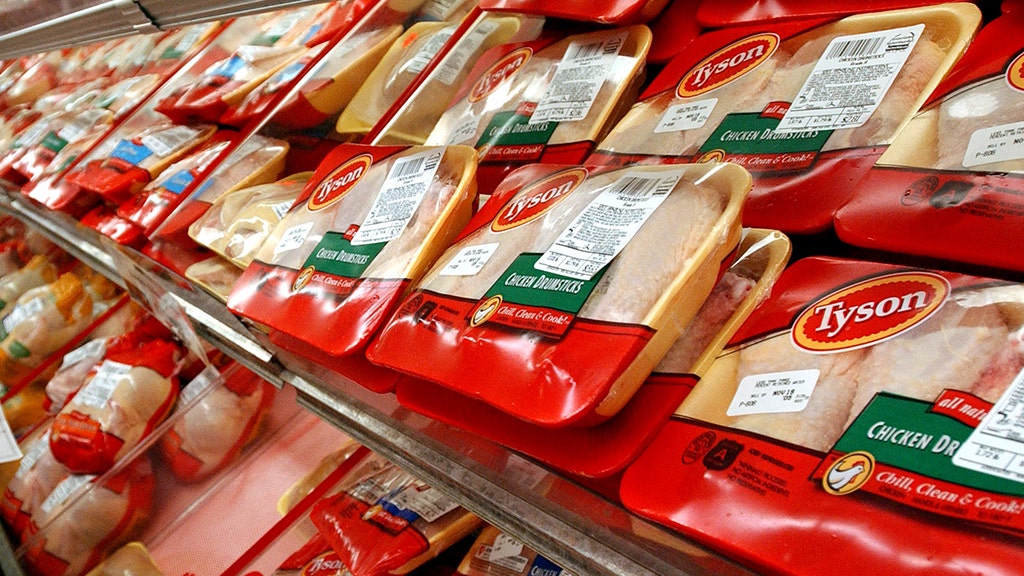
 www.foxbusiness.com
www.foxbusiness.com
"We expect to take continued pricing actions to ensure that any inflationary cost increases that our business incurs are passed along," said Tyson Foods CFO Stewart Glendinning on the company’s quarterly earnings call. "Our pricing has lagged inflation, but we expect to recover those cost increases during fiscal '22."

Tyson Foods plans further price hikes to offset inflation pressures
Tyson Foods Inc. is planning further price increases to offset soaring costs.
Psaki 8/27/2021

 www.dailywire.com
www.dailywire.com
Harris: 11/12/2021

 www.foxbusiness.com
www.foxbusiness.com
Obviously, the President’s commitment remains not raising taxes for anyone making less than $400,000 a year. There are some — and I’m not sure if this is the case in this report — who argue that, in the past, companies have passed on these costs to consumers. I’m not sure if that’s the argument being made in this report. We feel that that’s unfair and absurd, and the American people would not stand for that.

Psaki: It’s ‘Unfair And Absurd’ That Companies Would Raise Costs For Consumers Due To Higher Taxes
White House Press Secretary Jen Psaki claimed during Monday’s press briefing that it would be “unfair and absurd” for companies to raise costs on consumers in response to the Biden administration raising the corporate tax rate.Psaki made the remarks during the following interaction with a...
Harris: 11/12/2021
"Prices have gone up and families and individuals are dealing with the realities of the bread costs more, the gas costs more, and have to understand what that means," she said. "That’s about the cost of living going up. That’s about having to stress and stretch limited resources."
Harris said that is a "source of stress for families" that is "not only economic, but is, on a daily level, something that is a heavy weight to carry."

Kamala Harris acknowledges inflation surge is 'big deal' for Americans: 'Heavy weight to carry'
Vice President Kamala Harris on Friday acknowledged that inflation is a "big deal" for Americans, stressing that the Biden administration takes the issue "very seriously."
Thomas Barkin net worth
7.45 Million
Millions of dollars
Richmond Fed President Tom Barkin said Monday that he is content to wait a few more months before deciding if the central bank has to become more aggressive due to recent inflation trends.2 hours ago

Fed's Barkin says he is happy to wait a few more months to gauge 'reality' of inflation - News AKMI
[ad_1] Richmond Fed President Tom Barkin said Monday that he is content to wait a few more months before deciding if the central bank has to become more aggressive due to recent inflation trends. “I personally think it is very helpful for us to have a few more months to evaluate,” Barkin said...
 newsakmi.com
newsakmi.com
7.45 million is not a lot of money, especially when compared to who these banking types hang with.Thomas Barkin net worth
7.45 Million
Millions of dollars
Richmond Fed President Tom Barkin said Monday that he is content to wait a few more months before deciding if the central bank has to become more aggressive due to recent inflation trends.2 hours ago

Fed's Barkin says he is happy to wait a few more months to gauge 'reality' of inflation - News AKMI
[ad_1] Richmond Fed President Tom Barkin said Monday that he is content to wait a few more months before deciding if the central bank has to become more aggressive due to recent inflation trends. “I personally think it is very helpful for us to have a few more months to evaluate,” Barkin said...newsakmi.com
I have no personal opinion of Janet Yellen. You guys can debate that all you want.......
However, buried deep in all of the sensationalized, fake news recently... She is bring up the possibility that the US could default on it's debt. Given the destructive actions of this administration, that one event could make the USD worthless overnight.
The supreme art of war is to subdue the enemy without fighting.
Sun Tzu
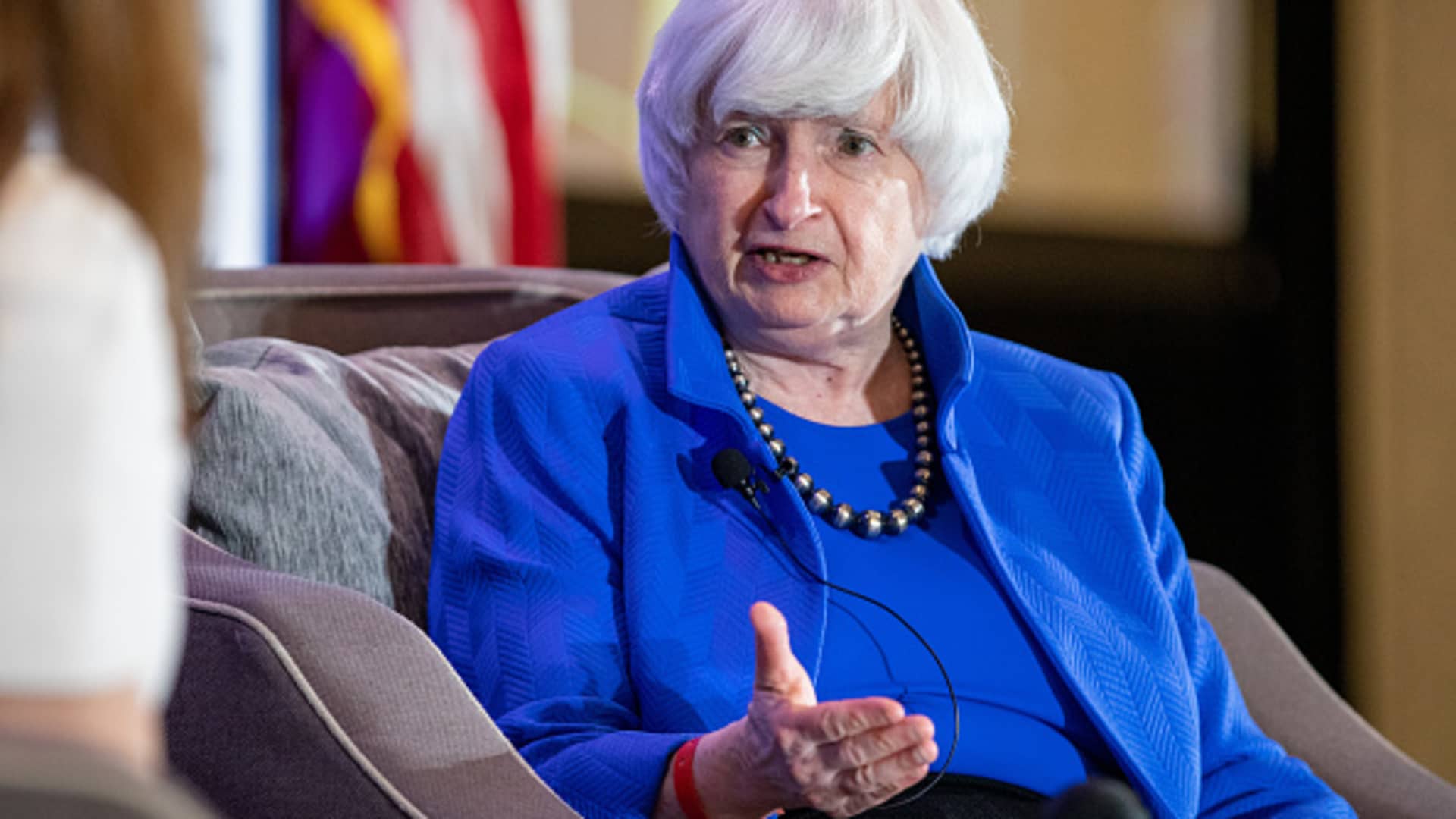
 www.cnbc.com
www.cnbc.com
However, buried deep in all of the sensationalized, fake news recently... She is bring up the possibility that the US could default on it's debt. Given the destructive actions of this administration, that one event could make the USD worthless overnight.
The supreme art of war is to subdue the enemy without fighting.
Sun Tzu

Yellen says U.S. could hit debt limit on Dec. 15, giving Congress more time to strike deal
Treasury Secretary Janet Yellen told lawmakers that she now estimates that the U.S. will reach its debt limit on Dec. 15.
Acknowledging upfront that this will be disjointed rambling...
First, a few reasons that CPI is bullshit:
1. The primary constituency of the Fed is banks. Especially big ones. It's constituency is NOT 99% of America. Think about everything that you know that is tied to CPI. From rent increases, alimony payments, to wage contracts. The more volatile CPI is the less certain is the future of everything tied to CPI. Fix CPI and you better fix your future. Banks do not like volatility. Not that any of us do, but most of us cannot control the measures of it, nor can we influence the policy tied to it. Bank can and do.
2. Carrying on with #1, every possible effort has been made to remove inflation from the measure of inflation. The fix is in from the start. Food and energy are removed because they are volatile. And who gives a shit about food and energy prices??? Pretty much everyone (but not entirely everyone). The average American family spends 10% of their income on food. So the average American sure as fuck cares about food price volatility. In exactly the same fashion, our lives are greatly influenced by prices at the pump. So while these prices experience inflation, and an assload of it, wage contracts ignore any such inflation.
-- side bar on this. For all of the moaning about wage inflation, price increases for the things people actually spend much of their income on have outstripped those gains. More on this later.
3. We pay for things at the price point they are today. And tomorrow we will pay for things at whatever the sticker price is at that time. The CPI is completely removed from this reality.
CPI is calculated via historical cost accounting. The CPI calculation's shelter component, which carries the greatest weight by far, is designed to reflect the average monthly cost to households who moved into their living space at a wide range of times over the last few decades. Other components are based on "price menus" published by retailers or fees set by public authorities, neither of which changes very frequently.
We could look to financial markets for a huge number of transaction prices for every minutes of the day. This data could not be easier to gather and aggregate. But government agencies stick to backwards looking myopia at a very narrow subset of data that is averaged (more or less) over long periods of time. You can decide for yourself which is a better measure. Do you live today and plan for tomorrow, or do you live like government analysts that gaze into a rear view mirror so small we have to squint to see it and that ONLY looks well into the past?
Rockets and feathers is an economic theory about how prices skyrocket in response to certain stimuli but come down very slowly once that stimulus has disappeared. That is reality. CPI has nothing to do with a recent, current, or future reality.
4. Food and energy are leading indicators of the CPI. Precious metals like gold are, in turn, leading indicators of food and energy prices. Not a lot of people realize this, but people who forecast these things are sure as fuck aware of it. Wanna guess who the very best forecasters of these things are... banks. Said another way, the people who scream the loudest about removing measures of volatility/inflation (food, energy, etc.) from the worlds most widely watched measure of volatility (CPI, aka "headline inflation") use those very same highly volatile measures (food, energy, etc.) to forecast volatility (CPI)...
First, a few reasons that CPI is bullshit:
1. The primary constituency of the Fed is banks. Especially big ones. It's constituency is NOT 99% of America. Think about everything that you know that is tied to CPI. From rent increases, alimony payments, to wage contracts. The more volatile CPI is the less certain is the future of everything tied to CPI. Fix CPI and you better fix your future. Banks do not like volatility. Not that any of us do, but most of us cannot control the measures of it, nor can we influence the policy tied to it. Bank can and do.
2. Carrying on with #1, every possible effort has been made to remove inflation from the measure of inflation. The fix is in from the start. Food and energy are removed because they are volatile. And who gives a shit about food and energy prices??? Pretty much everyone (but not entirely everyone). The average American family spends 10% of their income on food. So the average American sure as fuck cares about food price volatility. In exactly the same fashion, our lives are greatly influenced by prices at the pump. So while these prices experience inflation, and an assload of it, wage contracts ignore any such inflation.
-- side bar on this. For all of the moaning about wage inflation, price increases for the things people actually spend much of their income on have outstripped those gains. More on this later.
3. We pay for things at the price point they are today. And tomorrow we will pay for things at whatever the sticker price is at that time. The CPI is completely removed from this reality.
CPI is calculated via historical cost accounting. The CPI calculation's shelter component, which carries the greatest weight by far, is designed to reflect the average monthly cost to households who moved into their living space at a wide range of times over the last few decades. Other components are based on "price menus" published by retailers or fees set by public authorities, neither of which changes very frequently.
We could look to financial markets for a huge number of transaction prices for every minutes of the day. This data could not be easier to gather and aggregate. But government agencies stick to backwards looking myopia at a very narrow subset of data that is averaged (more or less) over long periods of time. You can decide for yourself which is a better measure. Do you live today and plan for tomorrow, or do you live like government analysts that gaze into a rear view mirror so small we have to squint to see it and that ONLY looks well into the past?
Rockets and feathers is an economic theory about how prices skyrocket in response to certain stimuli but come down very slowly once that stimulus has disappeared. That is reality. CPI has nothing to do with a recent, current, or future reality.
4. Food and energy are leading indicators of the CPI. Precious metals like gold are, in turn, leading indicators of food and energy prices. Not a lot of people realize this, but people who forecast these things are sure as fuck aware of it. Wanna guess who the very best forecasters of these things are... banks. Said another way, the people who scream the loudest about removing measures of volatility/inflation (food, energy, etc.) from the worlds most widely watched measure of volatility (CPI, aka "headline inflation") use those very same highly volatile measures (food, energy, etc.) to forecast volatility (CPI)...
Now for incoherent rambling about how you might might measure and forecast this stuff... Get ready for some tin-foil hat shit (if you can stomach reading this).
The only thing that matters in calculating and forecasting GDP, inflation, or any one of thousands of financial indices, is if you can do so accurately. Measuring markets is very, very different from assessing an individual firm, or even several firms.
Reality--- things like cash flow analysis are the bedrock of firm valuation. You are a fool to not do this.
Fantasy--- cash flow analysis for market pricing. At the end of the day there is always some gross fudge factor usually explained away with something like "goodwill". Use of such explanations is a quaint way of indicating one's incompetence. It is nothing short of gambling.
The reason firms like RennTech rely on hordes of mathematicians, computer scientists, and economists is because the feature set (factors) on which we may rely to accurately measure anything in the market changes both rapidly and constantly.
The Fed forecasts GDP using about 1,100 data points, most of which are some type of financial index. That number fluctuates as time goes by because some of those data points become less valuable to the forecast while others crop up that turn out to add to the models accuracy. This iterative search never ends. But the Fed is really not so great at its forecast, at least not compared to banks (and by banks I mean all kind of financial institutions). Why would this be? However you might assess their character they are certainly a very smart group of people.
On the quant side of things I'll tell you how I measure things like GDP. If anyone wants to know the nitty-gritty of the tech I am more than happy to lay it out in excruciating detail, but only if we start a separate thread.
First up, I cannot include data sources like Amazon's price data because, 1. you would never be granted access to those S3 buckets and, 2. You would need to be able to manipulate machinery that you likely don't have.
But we can definitely still do a very good job without all that:
1. Get some data. Every measure (feature) you need is collected by the St Louis Federal Reserve (The FRED). From employment and wage metrics, the manufacturing indices, there are thousand of data points that illuminate exactly what is going on, and will help you forecast what will likley happen next.
You can get these via their Excel add-in, but if you are going to do any real analysis you will want to grab a few thousand of them. A free and easy way to do this is with Python via API. You can put them on your own machine or someplace very low cost like GCP or AWS.
Yes, a little Python and SQL is required here, but like I said, a separate thread is need for the details. BTW, there are several folks on the Hide who are fluent in these 2 languages.
2. Modeling. To do things right you should code your own models. This takes a lot of training. By modeling I am talking about machine learning.
Fortunately, there is an alternative that can still yield good results. There is a growing set of tools called "auto ML", or automated machine learning. If you are a newb it will still take a bit of training/coaching. Otherwise, you will have no idea if you model is shit or not, and you will likely not really understand the output.
Having said that, products like H20 and PyCaret are free or at least have a free version. DataRobot is the bees knees if you have deep pockets. Just go with PyCaret. Auto ML has gobs of shortcomings, but it is a good way to learn the ropes.
I can get GDP to within 1% (MAPE) a quarter out and 2.5% 2 quarters out using about 400 series from the FRED. I can get CPI to 1% 52 weeks out. But this isn't even the interesting part.
3. Language. This is where the magic happens. When the Fed speaks, much like EF Hutton, this is what moves markets. It's the words. When earnings are released the financial market Illuminati pour over the words. What did they say, what was the sentiment, how did it differ from the last time words were spoken during an earnings release, how does it compare to thousands of news stories, are there inconsistencies, does the volume and pitch indicate confidence or stress?
The branch of data science that is concerned with words is called natural language processing, or NLP. There are many practical use cases: is an email or text message spam or not, can we gather the sentiment of customer reviews (positive, negative, or something else)?
Then there are more sophisticated uses. Dunn & Bradstreet issues credit ratings for companies to help firms decide how much credit they may give to a customer. But such credit ratings are based on past behavior. D&B now makes available news stores regarding any particular firm because sophisticated analysts can use those stories to find indicators of future credit impacting events. I am talking about many tens of thousands of news stories. We might look at every news story about General Electric (which would be a huge volume) but we would also want to analyze everything up and down stream... their suppliers and creditors.
News stories and words are about the most easily manipulated data point that exists. Hedge funds do this as a matter of course, and there is little to nothing illegal about it. The FBI has influenced news stories via leaks, then relied on those same news stories and support to get a search warrant.
More on this later... breakfast awaits.
The only thing that matters in calculating and forecasting GDP, inflation, or any one of thousands of financial indices, is if you can do so accurately. Measuring markets is very, very different from assessing an individual firm, or even several firms.
Reality--- things like cash flow analysis are the bedrock of firm valuation. You are a fool to not do this.
Fantasy--- cash flow analysis for market pricing. At the end of the day there is always some gross fudge factor usually explained away with something like "goodwill". Use of such explanations is a quaint way of indicating one's incompetence. It is nothing short of gambling.
The reason firms like RennTech rely on hordes of mathematicians, computer scientists, and economists is because the feature set (factors) on which we may rely to accurately measure anything in the market changes both rapidly and constantly.
The Fed forecasts GDP using about 1,100 data points, most of which are some type of financial index. That number fluctuates as time goes by because some of those data points become less valuable to the forecast while others crop up that turn out to add to the models accuracy. This iterative search never ends. But the Fed is really not so great at its forecast, at least not compared to banks (and by banks I mean all kind of financial institutions). Why would this be? However you might assess their character they are certainly a very smart group of people.
On the quant side of things I'll tell you how I measure things like GDP. If anyone wants to know the nitty-gritty of the tech I am more than happy to lay it out in excruciating detail, but only if we start a separate thread.
First up, I cannot include data sources like Amazon's price data because, 1. you would never be granted access to those S3 buckets and, 2. You would need to be able to manipulate machinery that you likely don't have.
But we can definitely still do a very good job without all that:
1. Get some data. Every measure (feature) you need is collected by the St Louis Federal Reserve (The FRED). From employment and wage metrics, the manufacturing indices, there are thousand of data points that illuminate exactly what is going on, and will help you forecast what will likley happen next.
You can get these via their Excel add-in, but if you are going to do any real analysis you will want to grab a few thousand of them. A free and easy way to do this is with Python via API. You can put them on your own machine or someplace very low cost like GCP or AWS.
Yes, a little Python and SQL is required here, but like I said, a separate thread is need for the details. BTW, there are several folks on the Hide who are fluent in these 2 languages.
2. Modeling. To do things right you should code your own models. This takes a lot of training. By modeling I am talking about machine learning.
Fortunately, there is an alternative that can still yield good results. There is a growing set of tools called "auto ML", or automated machine learning. If you are a newb it will still take a bit of training/coaching. Otherwise, you will have no idea if you model is shit or not, and you will likely not really understand the output.
Having said that, products like H20 and PyCaret are free or at least have a free version. DataRobot is the bees knees if you have deep pockets. Just go with PyCaret. Auto ML has gobs of shortcomings, but it is a good way to learn the ropes.
I can get GDP to within 1% (MAPE) a quarter out and 2.5% 2 quarters out using about 400 series from the FRED. I can get CPI to 1% 52 weeks out. But this isn't even the interesting part.
3. Language. This is where the magic happens. When the Fed speaks, much like EF Hutton, this is what moves markets. It's the words. When earnings are released the financial market Illuminati pour over the words. What did they say, what was the sentiment, how did it differ from the last time words were spoken during an earnings release, how does it compare to thousands of news stories, are there inconsistencies, does the volume and pitch indicate confidence or stress?
The branch of data science that is concerned with words is called natural language processing, or NLP. There are many practical use cases: is an email or text message spam or not, can we gather the sentiment of customer reviews (positive, negative, or something else)?
Then there are more sophisticated uses. Dunn & Bradstreet issues credit ratings for companies to help firms decide how much credit they may give to a customer. But such credit ratings are based on past behavior. D&B now makes available news stores regarding any particular firm because sophisticated analysts can use those stories to find indicators of future credit impacting events. I am talking about many tens of thousands of news stories. We might look at every news story about General Electric (which would be a huge volume) but we would also want to analyze everything up and down stream... their suppliers and creditors.
News stories and words are about the most easily manipulated data point that exists. Hedge funds do this as a matter of course, and there is little to nothing illegal about it. The FBI has influenced news stories via leaks, then relied on those same news stories and support to get a search warrant.
More on this later... breakfast awaits.
I read this earlier, pondered, re-read........ This is not a knee jerk reply...Now for incoherent rambling about how you might might measure and forecast this stuff... Get ready for some tin-foil hat shit (if you can stomach reading this).
The only thing that matters in calculating and forecasting GDP, inflation, or any one of thousands of financial indices, is if you can do so accurately. Measuring markets is very, very different from assessing an individual firm, or even several firms.
Reality--- things like cash flow analysis are the bedrock of firm valuation. You are a fool to not do this.
Fantasy--- cash flow analysis for market pricing. At the end of the day there is always some gross fudge factor usually explained away with something like "goodwill". Use of such explanations is a quaint way of indicating one's incompetence. It is nothing short of gambling.
The reason firms like RennTech rely on hordes of mathematicians, computer scientists, and economists is because the feature set (factors) on which we may rely to accurately measure anything in the market changes both rapidly and constantly.
The Fed forecasts GDP using about 1,100 data points, most of which are some type of financial index. That number fluctuates as time goes by because some of those data points become less valuable to the forecast while others crop up that turn out to add to the models accuracy. This iterative search never ends. But the Fed is really not so great at its forecast, at least not compared to banks (and by banks I mean all kind of financial institutions). Why would this be? However you might assess their character they are certainly a very smart group of people.
On the quant side of things I'll tell you how I measure things like GDP. If anyone wants to know the nitty-gritty of the tech I am more than happy to lay it out in excruciating detail, but only if we start a separate thread.
First up, I cannot include data sources like Amazon's price data because, 1. you would never be granted access to those S3 buckets and, 2. You would need to be able to manipulate machinery that you likely don't have.
But we can definitely still do a very good job without all that:
1. Get some data. Every measure (feature) you need is collected by the St Louis Federal Reserve (The FRED). From employment and wage metrics, the manufacturing indices, there are thousand of data points that illuminate exactly what is going on, and will help you forecast what will likley happen next.
You can get these via their Excel add-in, but if you are going to do any real analysis you will want to grab a few thousand of them. A free and easy way to do this is with Python via API. You can put them on your own machine or someplace very low cost like GCP or AWS.
Yes, a little Python and SQL is required here, but like I said, a separate thread is need for the details. BTW, there are several folks on the Hide who are fluent in these 2 languages.
2. Modeling. To do things right you should code your own models. This takes a lot of training. By modeling I am talking about machine learning.
Fortunately, there is an alternative that can still yield good results. There is a growing set of tools called "auto ML", or automated machine learning. If you are a newb it will still take a bit of training/coaching. Otherwise, you will have no idea if you model is shit or not, and you will likely not really understand the output.
Having said that, products like H20 and PyCaret are free or at least have a free version. DataRobot is the bees knees if you have deep pockets. Just go with PyCaret. Auto ML has gobs of shortcomings, but it is a good way to learn the ropes.
I can get GDP to within 1% (MAPE) a quarter out and 2.5% 2 quarters out using about 400 series from the FRED. I can get CPI to 1% 52 weeks out. But this isn't even the interesting part.
3. Language. This is where the magic happens. When the Fed speaks, much like EF Hutton, this is what moves markets. It's the words. When earnings are released the financial market Illuminati pour over the words. What did they say, what was the sentiment, how did it differ from the last time words were spoken during an earnings release, how does it compare to thousands of news stories, are there inconsistencies, does the volume and pitch indicate confidence or stress?
The branch of data science that is concerned with words is called natural language processing, or NLP. There are many practical use cases: is an email or text message spam or not, can we gather the sentiment of customer reviews (positive, negative, or something else)?
Then there are more sophisticated uses. Dunn & Bradstreet issues credit ratings for companies to help firms decide how much credit they may give to a customer. But such credit ratings are based on past behavior. D&B now makes available news stores regarding any particular firm because sophisticated analysts can use those stories to find indicators of future credit impacting events. I am talking about many tens of thousands of news stories. We might look at every news story about General Electric (which would be a huge volume) but we would also want to analyze everything up and down stream... their suppliers and creditors.
News stories and words are about the most easily manipulated data point that exists. Hedge funds do this as a matter of course, and there is little to nothing illegal about it. The FBI has influenced news stories via leaks, then relied on those same news stories and support to get a search warrant.
More on this later... breakfast awaits.
The majority of your thoughts are "historical"... You did mention forecasting, however you did not forecast the future. Those of us in the "Survival Camp" need credible, forward looking thoughts.....
I'll give you a scenario:
You are a blue collar construction worker, half way to a job 30 miles from your home on December 20, 2021. The 6 am news says.. "the United States has defaulted on it's debt. You are making your routine stop at the Mini Market for coffee and some fuel for your truck that is on empty. As you grab your go cup and get to the door of the store, there is a sign that says "Sorry, we are not accepting credit / debit or cash"....... You go to the counter and the Camel Jockey (who lived through this in his home country) says you must pay for your coffee and fuel in something he recognizes or will accept. You go back to your truck, dig behind the seat and pull out old, beat up plastic container and head back to the counter. In your mind you know you need 10 gallons of fuel to get back home. No need to go to the jobsite. You tell the Camel Jockey you need 10 gallons of fuel and a coffee. You open the box and he see's it is full of junk silver dimes.... You two look at each other "eye ball to eye ball"... He knows you are packing and you know he has a coach gun behind the counter.... The playing field is level. The bartering session was short and to the point. You two exchange nod's and you go out to the pump, get your fuel, sip your coffee and head your truck towards home...
Your thoughts are similar to.....MosesTheTank .....incoherent ramblings as you plan your arrival at your home.
Where will we (America) be in one week, one month, one year ?
Hobo
Since May 16, 2021 your Actual has fallen below your Prediction..... Your prediction has plateaued for the last 6 months.... So, will the first 6 months of 2022 have an increase or a decrease in new job postings ?..... Why ?
PM sentSince May 16, 2021 your Actual has fallen below your Prediction..... Your prediction has plateaued for the last 6 months.... So, will the first 6 months of 2022 have an increase or a decrease in new job postings ?..... Why ?
Up 25%.... No big surprise on this one:
Dollar Tree raises prices to $1.25
Raising prices will give Dollar Tree more flexibility to reintroduce those items, expand its selection and bring new products and sizes to its stores.So, here we are.... Starting to see the results of the US Government's "Free Money" give away.PM sent
1-U.S. initial jobless claims plunge to their lowest level since 1969
2- Not since Americans came home from World War II has inflation percolated through the U.S. economy like it is now, and it could continue to do so for months to come.
3- Productivity in the U.S fell by the most since 1981 in the third quarter, reflecting a sharp pullback in economic growth and an increase in hours worked.

Not since Americans came home from World War II has inflation run through the economy like it is now
Not since Americans came home from World War II has inflation percolated through the economy like it is now, and it could continue to do so for months to come.
US Natural gas prices are up 84% for this year. American's will feel it in their pocket books this winter.
_____
Nov 24 (Reuters) - U.S. liquefied natural gas (LNG) company Cheniere Energy Inc (LNG.A) said Wednesday its marketing arm agreed to sell LNG to a unit of Chinese natural gas distribution company Foran Energy Group Co Ltd (002911.SZ) for 20 years starting in January 2023.
/cloudfront-us-east-2.images.arcpublishing.com/reuters/QREYLV7SWFMBDHNDKL24ZAPPE4.jpg)
 www.reuters.com
www.reuters.com
_____
Nov 24 (Reuters) - U.S. liquefied natural gas (LNG) company Cheniere Energy Inc (LNG.A) said Wednesday its marketing arm agreed to sell LNG to a unit of Chinese natural gas distribution company Foran Energy Group Co Ltd (002911.SZ) for 20 years starting in January 2023.
/cloudfront-us-east-2.images.arcpublishing.com/reuters/QREYLV7SWFMBDHNDKL24ZAPPE4.jpg)
Cheniere to sell U.S. LNG to China's Foran Group
U.S. liquefied natural gas (LNG) company Cheniere Energy Inc said Wednesday its marketing arm agreed to sell LNG to a unit of Chinese natural gas distribution company Foran Energy Group Co Ltd for 20 years starting in January 2023.
Nov 29 (Reuters) - U.S. Federal Reserve Chair Jerome Powell on Monday said he continues to expect inflation to recede over the next year as supply and demand come into better balance, but warned that the new strain of COVID-19 muddies the outlook, and prices could continue to rise for longer than earlier thought.
What a bunch of crap.
About as reliable as fouci.
Also just as two faced of a statement.
Forgot to add the disclaimer "I don't have a clue but I seem to manage to keep my job".
About as reliable as fouci.
Also just as two faced of a statement.
Forgot to add the disclaimer "I don't have a clue but I seem to manage to keep my job".
Let me make the prediction.
This shit will last as long as communists are in the White House.
This shit will last as long as communists are in the White House.
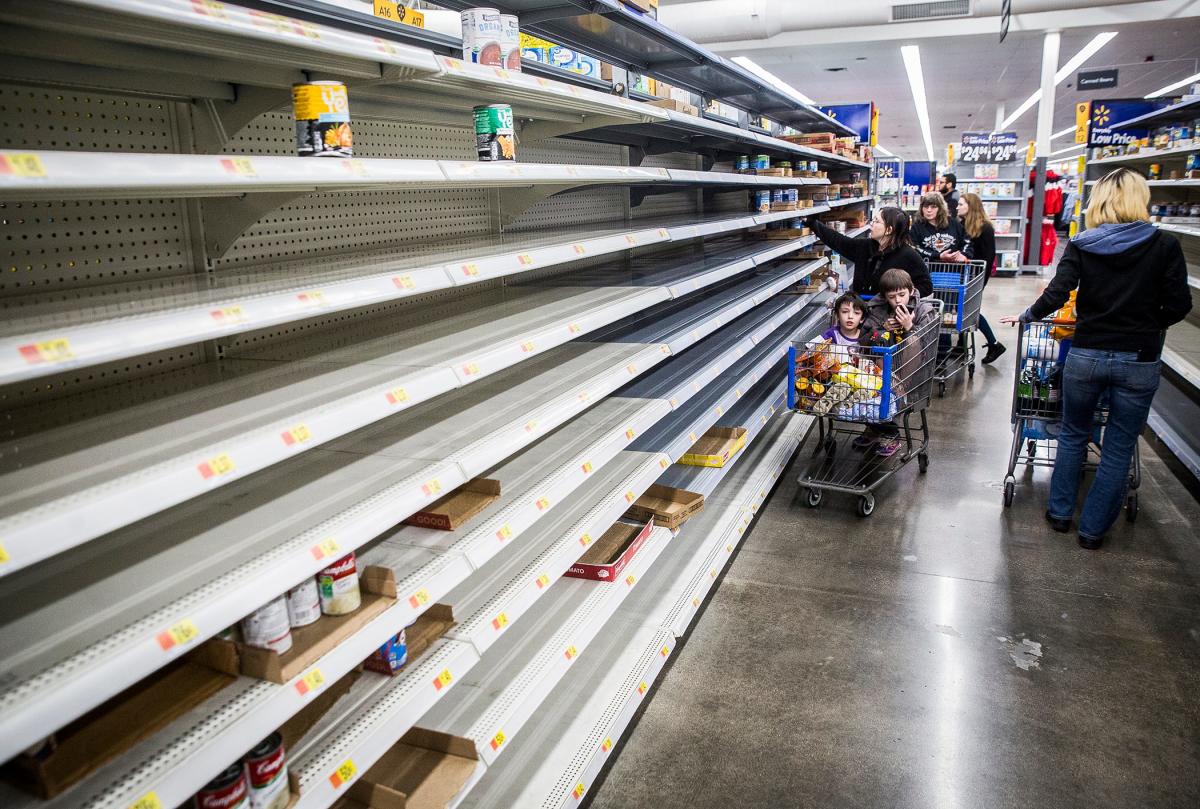
FTC orders Walmart, Amazon, Kroger and more to turn over information on empty shelves, high prices
The FTC is ordering Walmart, Amazon, Kroger “to turn over information to help study causes of empty shelves and sky-high prices" for an investigation.
We truly live in
Where is the damn FTC when we need varget and xbr 8208?
I want an investigation.
I want an investigation.
Medicare's Part B monthly premium for 2022 will increase by $21.60, the largest dollar increase in the health insurance program's history, the Centers for Medicare & Medicaid Services (CMS) announced on Nov. 12. Standard monthly premiums for Part B will cost $170.10 in 2022, up from $148.50 in 2021.
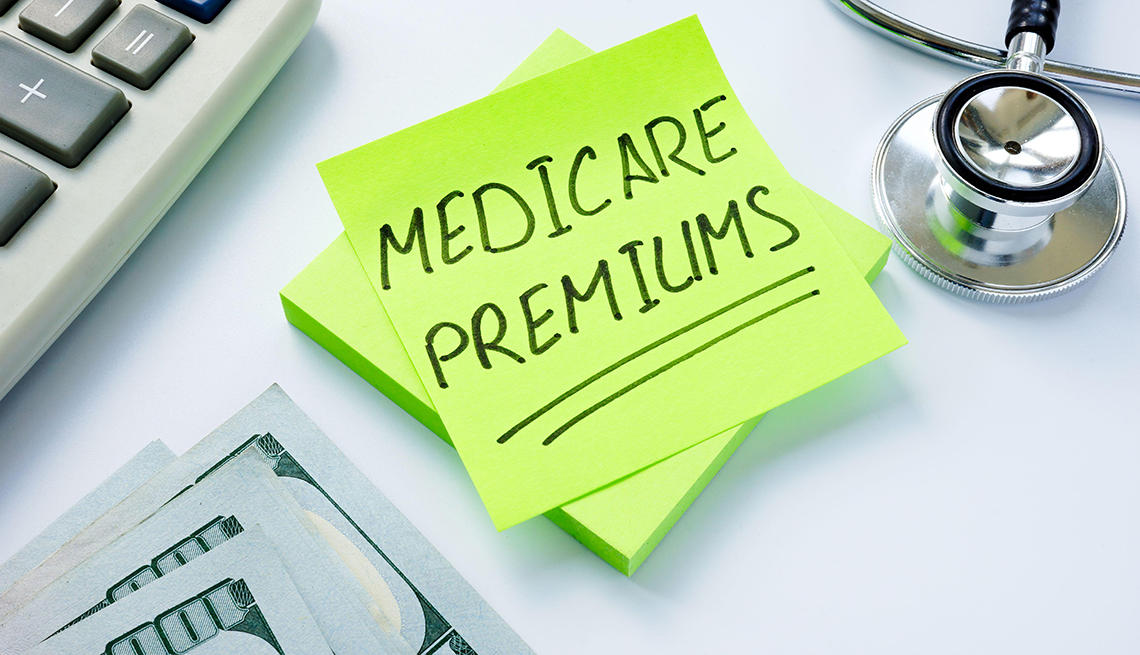
 www.aarp.org
www.aarp.org

âMedicare Part B Premium Increase for 2022 Largest Ever
Medicare Part B premiums will see its largest increase ever, but officials say a Social Security COLA increase will offset the monthly hike.
Transitory Inflation .....
Here is a short video of Jerome Powell saying it is time to retire the phrase transitory inflation...... Funny thing, I was never able to retire any of my forecast in life.
/cloudfront-us-east-2.images.arcpublishing.com/reuters/RX5FGVJZMZLDZDTYSXI6QDG3CU.jpg)
 www.reuters.com
www.reuters.com
Here is a short video of Jerome Powell saying it is time to retire the phrase transitory inflation...... Funny thing, I was never able to retire any of my forecast in life.
/cloudfront-us-east-2.images.arcpublishing.com/reuters/RX5FGVJZMZLDZDTYSXI6QDG3CU.jpg)
Powell places faster bond-buying taper on Fed's Christmas table
U.S. central bankers in December will discuss whether to end their bond purchases a few months earlier than had been anticipated, Federal Reserve Chair Jerome Powell said on Tuesday, pointing to a strong economy, stalled workforce growth, and high inflation that is expected to last into mid-2022.
OATS.... UP.... 131% over the past 12 months.
Between 50% and 90% of the world oat production is used as animal feed for horses, cattle, and sheep. Naked oats are particularly suited for poultry, pigs, racehorses, and birds.
Just something to think about.
Between 50% and 90% of the world oat production is used as animal feed for horses, cattle, and sheep. Naked oats are particularly suited for poultry, pigs, racehorses, and birds.
Just something to think about.
Attachments
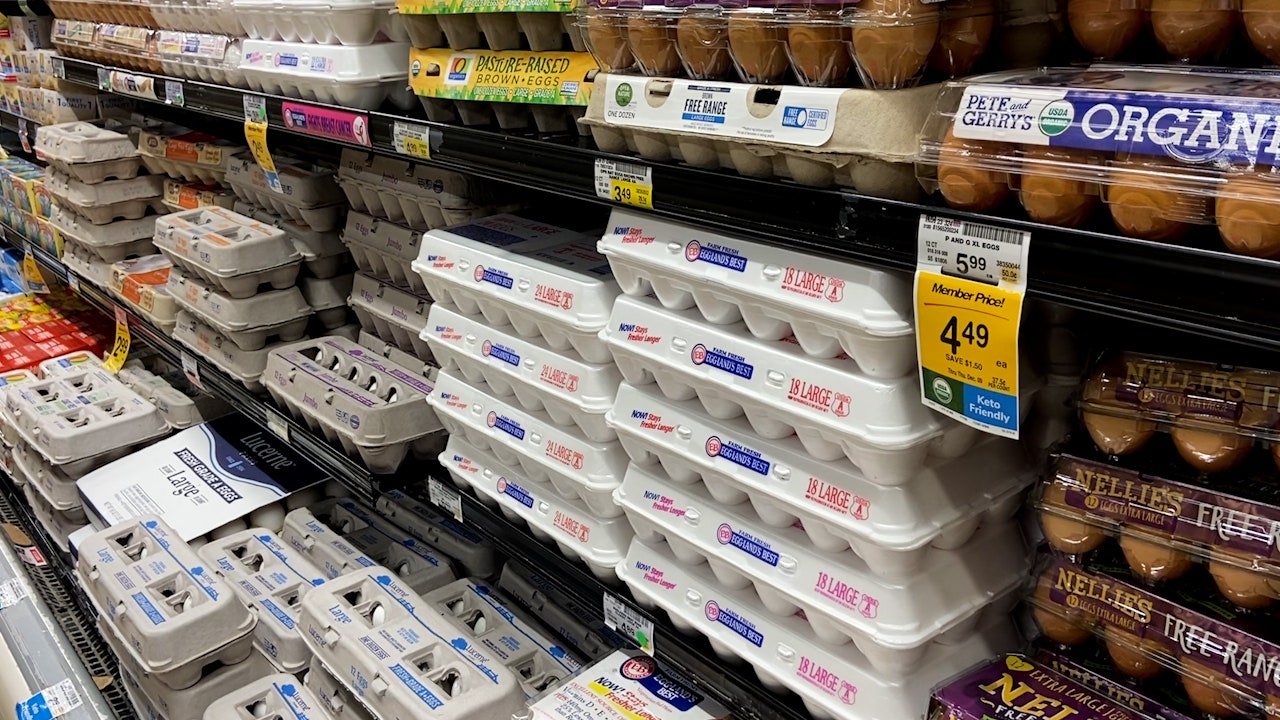
Egg farmer raises prices for first time in seven years over supply chain issues
An egg farmer details supply chain issues and how they've impacted the small farm, and its egg prices.
Inflation was always here to stay. Price inflation is not going to go away because the currency inflation is not being reduced and there is no destruction of capital. IOW, there is no deflation (yet) to get us back to where we were at some point in the past. Nope, right now is about as cheap as things will be from here on out.
The real question is what do they mean that inflation is no longer transitory - do they mean that prices are not going to go down (accurate), or do the REALLY mean that prices are still going to go up from here - IOW, fewer goods and/or more money printing. Some of it is definitely more money printing - to cover the $1.5T bill that is estimated to actually cost several trillion more.
Nothing is getting cheaper. Most goods and services will go up from here.
The real question is what do they mean that inflation is no longer transitory - do they mean that prices are not going to go down (accurate), or do the REALLY mean that prices are still going to go up from here - IOW, fewer goods and/or more money printing. Some of it is definitely more money printing - to cover the $1.5T bill that is estimated to actually cost several trillion more.
Nothing is getting cheaper. Most goods and services will go up from here.
The troubling thought is "What gives a USD it's value?".......Inflation was always here to stay. Price inflation is not going to go away because the currency inflation is not being reduced and there is no destruction of capital. IOW, there is no deflation (yet) to get us back to where we were at some point in the past. Nope, right now is about as cheap as things will be from here on out.
The real question is what do they mean that inflation is no longer transitory - do they mean that prices are not going to go down (accurate), or do the REALLY mean that prices are still going to go up from here - IOW, fewer goods and/or more money printing. Some of it is definitely more money printing - to cover the $1.5T bill that is estimated to actually cost several trillion more.
Nothing is getting cheaper. Most goods and services will go up from here.
Rome overhauled its coinage shortly before 211 BC, and introduced the denarius alongside a short-lived denomination called the victoriatus. The denarius contained an average 4.5 grams, or 1⁄72 of a Roman pound, of silver, and was at first tariffed at ten asses, hence its name, which means 'tenner'. It formed the backbone of Roman currency throughout the Roman republic and the early empire.[9]
From a purity of greater than 90% silver in the 1st century AD, the denarius fell to under 60% purity by AD 200, and plummeted to 5% purity by AD 300.[
The only way to save the USD is to go back to having a USD backed by gold.....
Never going to happen. Digital is next. And if I’m right, before 2030.The troubling thought is "What gives a USD it's value?".......
Rome overhauled its coinage shortly before 211 BC, and introduced the denarius alongside a short-lived denomination called the victoriatus. The denarius contained an average 4.5 grams, or 1⁄72 of a Roman pound, of silver, and was at first tariffed at ten asses, hence its name, which means 'tenner'. It formed the backbone of Roman currency throughout the Roman republic and the early empire.[9]
From a purity of greater than 90% silver in the 1st century AD, the denarius fell to under 60% purity by AD 200, and plummeted to 5% purity by AD 300.[
The only way to save the USD is to go back to having a USD backed by gold.....
See before it was full faith and credit. Now faith really doesn’t seem to be required. It’s use it or lose it. Case in point: what does bitcoin really have backing it? But some seem to love it. Everything seems to be in the same boat at this point.

Investors brace for the highest inflation reading in nearly 40 years
Wall Street expects the the CPI to reflect a 0.7% gain for the month, which would translate into a 6.7% increase from a year ago

Inflation surged 6.8% in November, even more than expected, to fastest rate since 1982
Inflation accelerated at its fastest pace since 1982 in November, the Labor Department said Friday.
Now is a good time to lock in a low interest home loan.... but a bad time to run up a large credit card balance... Things will be different by mid 2022...
_____________
December 7 – Financial Times (Colby Smith, Christine Zhang and Caitlin Gilbert): “The Federal Reserve will end its bond-buying programme by the end of March and raise US interest rates soon after, according to a poll of leading academic economists for the Financial Times. The latest survey… marks an abrupt shift in the economists’ expectations at a time of surging inflation and tumbling unemployment. Their responses underscore how swiftly the economic situation in the US has evolved over just a handful of months, as well as the pivot under way at the US central bank as it quickly unwinds its pandemic-era support to focus on fighting soaring prices.”
_____________
December 7 – Financial Times (Colby Smith, Christine Zhang and Caitlin Gilbert): “The Federal Reserve will end its bond-buying programme by the end of March and raise US interest rates soon after, according to a poll of leading academic economists for the Financial Times. The latest survey… marks an abrupt shift in the economists’ expectations at a time of surging inflation and tumbling unemployment. Their responses underscore how swiftly the economic situation in the US has evolved over just a handful of months, as well as the pivot under way at the US central bank as it quickly unwinds its pandemic-era support to focus on fighting soaring prices.”
Similar threads
- Replies
- 32
- Views
- 1K
- Replies
- 109
- Views
- 4K
- Replies
- 61
- Views
- 2K
